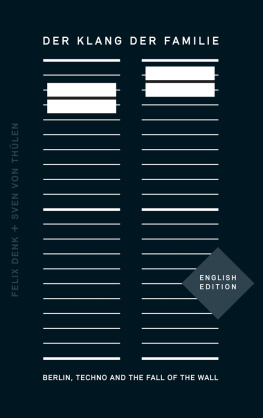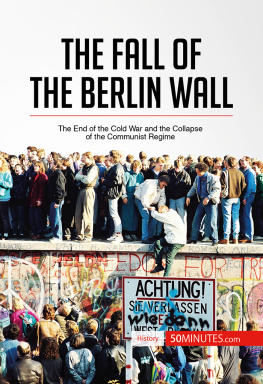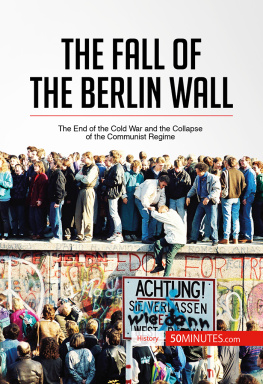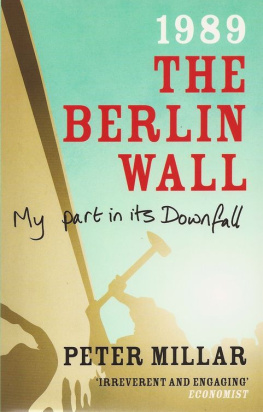After the fall of the Wall, Berlin is full of disused spaces and abandoned buildings, just waiting to be filled with new life. It is unclear who owns any of this, which allows the techno scene to take over these new empty spaces in both halves of the city. Clubs, galleries, ateliers and studios spring up only to disappear again a few weeks later. Soon Berlin has become the epicentre of a new culture, attracting enthusiastic followers from all over the world to clubs like the Tresor and the E-Werk. Wearing gasmasks and welding goggles they dance the night away to the jackhammer sound of previously obscure Detroit DJs. Among them are writers, artists, photographers, designers, DJs, club-owners, music producers, bouncers and scenesters, people from the centre of the movement and from its peripheries in Der Klang der Familie they all get to have their say and paint a vibrant picture of a time when it felt like everything was possible.
Felix Denk, Sven von Thlen 2014
Production and Publishing: BoD - Books on Demand GmbH, Norderstedt
The book is sold subject to the condition that it shall not, by way of trade or otherwise, be lent, resold, hired out, or otherwise circulated without the publishers prior consent in any form of binding or cover other than that in which it is published and without a similar condition including this condition being imposed on the subsequent purchaser.
Cover artwork by Jan Rikus Hillmann, burningbluesoul.com
First published in Germany in March 2012 by Suhrkamp Verlag
ISBN 9783738663273
For Silke, Henry and Oskar
For Lili
CONTENT
PREFACE
It was basically pure coincidence. This new, raw, stark machine music appeared and then the Wall came down. In East Berlin, the administration collapsed; the former GDR capital became a temporary autonomous zone. Suddenly, there were all these spaces to discover: a panzer chamber in the dusty no mans land of the former death strip, a World War II bunker, a decommissioned soap factory on the Spree, a transformer station opposite the erstwhile Reich Ministry of Aviation. And suddenly, people were dancing at all these sites rejected by recent history, to a music virtually reinvented from week to week.
Put simply, techno originated in Detroit in the mid 80s. But the new electronic sounds didnt find a home in the crisis-ridden Motor City. No club scene developed around the music, which became an export by necessity. Detroit musicians found their largest following in Berlin, of all places, and a symbiotic relationship developed between the two desolate cities. Aside from the efforts and enthusiasm of a few music freaks, this, too, was for the most part a matter of chance.
At the time, Berlin couldnt look back on a long history of electronic music unlike, say, Frankfurt, where a professional network of clubs, producers and labels had been operating since the 80s. Even the word techno was already being used there. West Berlin, by contrast, was a rock city, albeit an experimental one. Bands like the Einstrzende Neubauten and movements like the Geniale Dilletanten meant there was a fairly broad understanding of what the word music could mean. And in clubs like Metropol, a small DJ culture was already emerging, born from the days of disco.
In East Berlin, of course, everything was different. Youth culture was something clandestine, even dangerous. The first generation of punks was vigorously persecuted. Young people were accustomed to seeking out niches. One of them was breakdancing, which began to shape GDR subculture far earlier than in West Germany, a fact which explains the Easts special enthusiasm for electronic sounds.
Techno became the soundtrack of reunification-era Berlin for three main reasons: the pure kinetic energy of the new sounds, the magic of the places it was played and the promise of freedom it contained. Suddenly, it seemed, everyone could program his own world: DJ, produce, start magazines, print t-shirts. Techno was a music that called for participation, a sound of flat hierarchies. Not for nothing was it referred to in the early days as a music with no need for stars. There didnt seem to be any room for them. The human disappeared in the tracks; the artist subject dissolved in the circuitry of the drum machine, the binary codes of the sampler and the ever-changing project names of the producers. At the beginning, even the DJ was part of the party, not its focus or star. The star was the party itself and with it, all the abandoned, decaying venues transformed into dance floors, sometimes for a night, sometimes long enough that people from around the world could come dance on them.
Few music genres have brought together such a disparate mix of people with a shared feeling of joy. At the early techno parties, breakdancers from Alexanderplatz, football hooligans, former East German punks and radio junkies encountered a West Berlin conglomerate of Schneberg gays, Kreuzberg squatters, students, artists, English soldiers on furlough and American expats in Berlin for the cheap rents. For a while, it seemed as though differences no longer mattered, nor where you came from or what you were wearing. So long as you participated. Everything was focused on the music and the new togetherness on and alongside the dance floor. The exuberant, contradictory community that converged there every weekend really saw itself as a family in the early years, at least.
This book tells the story of that impromptu family, from its subcultural beginnings to the moment techno stormed the charts and the very rules and market mechanisms that seemed not to apply at the beginning found their way into the scene. Of course, chart hits like Marushas Somewhere Over the Rainbow werent the swansong of techno. Quite to the contrary, the music has continued even today, in ever new forms, to conquer the last corners of pop culture and shape like no other the image of Berlin. But they did herald the end of the anarchic beginning. From a subculture grew a culture.
We werent there back then. Der Klang der Familie We would like to thank all the interviewees for meeting us with so much trust and taking so much time to share their memories. We hope we can give something back with this book.
Thanks also to those interviewees who unfortunately didnt find their due place in the book, particularly Moritz von Oswald, Kay Itting, Sandra Molzahn and Frank Schtte. We would especially like to thank Carola Stoiber, Arne Grahm, Stefan Schvanke, Mijk van Dijk, Jrgen Laarmann and Dimitri Hegemann for their organizational help and DJs Tanith, Rok, Cl, Jonzon, Terrible, Zappa and Dr. Motte for their playlists. Jrgen Teipels Verschwende Deine Jugend served as an important inspiration, and we thank him for lending his counsel and advice. Jan Rikus Hillmann designed so many fabulous covers, we could have turned the book into a series. Thanks finally to Sebastian Leber from the Tagesspiegel, without whom we would never have met our agent Marko Jacob from Landwehr & Cie, who, in turn, introduced us to our editor Thomas Halupczok, who always kept an eye on the essentials when we had long since lost sight of them.
Wed like to thank Jenna Krumminga, who spent the hot Berlin summer of 2014 translating this book from the German, and Viktoria Pelles, who edited the translation. Wed also like to thank Alexander Seeberg-Elverfeldt, whos responsible for the look and layout of this volume.
Felix Denk Sven von Thlen
Berlin, October 2014
The ingenious amateurs or dilettante geniuses was a broad underground movement encompassing various musical genres, united primarily by an eagerness to experiment and a contempt for the professionalization of music production. Though the misspelling of dilettantes originated in a mistake, it was kept as a nod to the ethos that amateurs, unlike professionals, embrace their mistakes and consciously incorporate them into their work.
Next page








